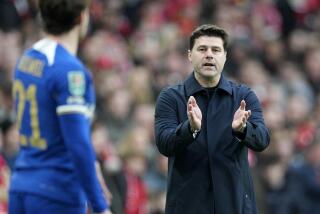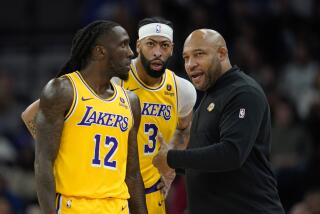Swede Pilloried in English Press
- Share via
Xenophobia is an extraordinary thing, and these days England is awash in it.
Take, for example, the ugly reaction that bubbled to the surface last week when the English Football Assn., to its vast credit, broke 128 years of tradition and named a foreigner as England’s national team coach.
The five-year, $2.6 million-a-year contract accepted by Sweden’s Sven-Goran Eriksson was greeted with howls of anger and outrage from expected and unexpected quarters.
“Disaster!” shrieked the Daily Mirror.
“And so the nation which gave the game of football to the world has been forced to put a foreign coach in charge of its national team for the first time in history,” wrote John Sadler in the equally hysterical Sun.
“What a climb-down. What an admission of decline. What a humiliation. What a terrible, pathetic, self-inflicted indictment. What an awful mess.”
What a welcome for the urbane and educated Eriksson, the 53-year-old who has coached such top teams as IFK Gothenburg, Benfica, AS Roma, Fiorentina, Sampdoria and Lazio. Eriksson has won championships in Sweden, Portugal and Italy in a 24-year coaching career.
Yet columnist Jeff Powell of the Daily Mail felt it necessary to say that England had sold the country’s soccer birthright “down the fjord to a nation of seven million skiers and hammer throwers who spend half their year living in total darkness.”
The reaction from the tabloids was predictable. They are in the business of selling newspapers, not elevating journalism.
But there were others who should have shown more taste and common sense.
“I believe an Englishman would do a lot better at selecting an English team to play against the best teams in the world,” Jack Charlton said. “I think it’s a terrible mistake. The French are managed by a Frenchman, the Germans have a German in charge and the Italians have one of their own. Who have we got? Someone who has never managed in this country before.
“I am very, very upset and I would imagine all the boys I played with in the [1966 England] World Cup team would be too.”
Charlton could do worse than ponder the downturn his career might have taken had Ireland exhibited such views. Fortunately for him, the Irish didn’t object to Charlton, a foreigner, being their national coach.
He would also do well to remember that the World Cup team he refers to played together 34 years ago, and that the English national team has been sliding down a slippery slope to oblivion ever since.
In the past four years, the fall has been precipitous.
It began on a painful afternoon in 1996 when England lost on penalty kicks to Germany at Wembley Stadium in the semifinals of the European Championship.
It’s been nothing but downhill since.
The headlines have not been about victories, they have been about English hooligans running riot in the streets of France and Belgium; of English players drinking, carousing and gambling; of early ousters from the France ’98 World Cup and Euro 2000 tournaments.
On top of all that, Wembley Stadium, the home of the game and a soccer shrine for 77 years, is being torn down. The final game was played there Oct. 7 and produced--almost predictably--a 1-0 World Cup 2002 qualifying loss to Germany. That it was raining that afternoon was also predictable.
*
A succession of four flawed coaches has added to the national gloom. They were:
* Graham Taylor, whose face the English tabloids unforgettably superimposed on a turnip during a catastrophic Euro ’92 campaign and whose greatest sin was losing a game to the United States.
* Terry Venables, who took the England team to the Euro ’96 semifinals but whose financial dealings were viewed with increasing skepticism by the Football Assn.
* Glenn Hoddle, who bizarrely employed a faith healer and who even more bizarrely claimed the disabled were paying the price of sins committed in their earlier lives.
* Kevin Keegan, who was tactically clueless and who turned a blind eye to gambling by his wealthy but talentless players, some of whom are now accused by the tabloids of playing cards for as much as $14,000 a hand.
As The Times of London pointed out: “The Football Association was happy to trade an ability to sing ‘God Save The Queen’ for a grasp of tactics and a keen mind.”
And yet, despite all this, the barbs have flown Eriksson’s way.
“I wish him well but I think there will be tears at the end of the day,” said Gordon Taylor, head of the Professional Footballers Assn., the players’ union. “I just can’t see it working out in England. I think it’s really a betrayal of our heritage and of our coaching structure.
“He’s a quality coach and he respects players, but I think he’ll just wonder what’s hit him when we have the first bad result and he sees the media intensity.”
Viewpoints such as these, wrote Oliver Holt in The Times of London, reflect “sad and lingering delusions of superiority” in an age when England has long since ceased to be feared as a soccer power.
“What has hurt these men who are trying their damnedest to burrow their heads deeper into the sand is that the appointment of a foreign coach has long been seen as a sign of footballing fragility,” Holt wrote.
“It is the kind of move that emerging nations such as Nigeria and Japan usually make. As such, it is an admission of weakness, and there are some who are too proud to admit that England have now fallen from the ranks of the leading football countries.”
Eriksson should be welcomed as someone who might be able to reverse the decline, rather than lambasted simply because of his nationality.
The English FA realized it would be criticized for its choice, but made the move anyway.
“I am disappointed but not surprised at that reaction,” Chief Executive Adam Crozier said. “But we have got to move on and stop thinking about the way it has been. That’s not going to get us anywhere. We haven’t exactly overachieved for a number of years. We needed to do something dramatic. We have done it but in a sensible way.”
Eriksson will take charge of England on July 1 after his contract with Lazio expires.
He is the right man for the job, the man who once coached him as a player told Reuters.
“He is a very ordinary guy, well brought up, polite and calm, never any outbursts of emotions,” said Sven-Ake Olsson, coach of Torsby IF. “He always thinks first, then speaks. It’s in his blood. He does not get excited easily.
“The English will be pleased. This guy takes his job seriously. He is already very tough, you see. He can speak with the big stars to make them understand his way of thinking. He is very good at that.”
As for Eriksson himself, he flew to England last week and talked to the media for an hour about what he hoped to achieve. The issue of being the first foreigner in charge was met head on.
“I can understand what people are saying, that the English team should have an English manager,” he said. “But Sweden had an English manager [George Raynor] many years ago who almost won them the World Cup in 1958. Why shouldn’t a Swede many years later go to England?
“With some things in life there are always people against you, whether it’s in football or not. It’s up to me to show in the next years that we will have a lot of people with us, not against us.
“I was very surprised to be offered the job, and very honored. I could have earned more if I had stayed in Italy or gone to Spain, so it is not for the money or for the weather, that is for sure.
“My biggest fear is the invasion of the tabloid newspapers into my private life because, in the last few days, they have already contacted my brother in Portugal, my son, who is studying in America, my ex-mother-in-law and my ex-wife, whom I haven’t seen for six years.
“But it is the greatest challenge of my career. You don’t say no to the inventors of football.”
More to Read
Go beyond the scoreboard
Get the latest on L.A.'s teams in the daily Sports Report newsletter.
You may occasionally receive promotional content from the Los Angeles Times.






